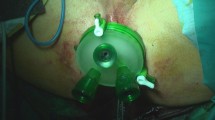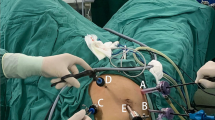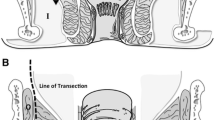Abstract
Background
Laparoscopic abdominoperineal resection (APR) for low rectal cancer (LRC) is performed worldwide. However, APR involves technical difficulties and often causes intractable perineal complications. Therefore, a novel and secure technique during APR is required to overcome these critical issues. Although the usefulness of the endoscopic trans-anal approach has been documented, no series of the endoscopic trans-perineal approach during laparoscopic APR for LRC has been reported.
Methods
Trans-perineal minimally invasive surgery (TpMIS) has been used during laparoscopic APR in our institution since April 2014. TpMIS is defined as an endoscopic trans-perineal approach using a single-port device and laparoscopic instruments. In this study, we retrospectively evaluated 50 consecutive patients with LRC who underwent laparoscopic APR at our institution from February 2011 to June 2017 and compared the outcomes of the patients who underwent TpMIS [trans-perineal APR (TpAPR) group, n = 21] versus the conventional trans-perineal approach (conventional group, n = 29). We investigated our experiences with TpMIS in detail and evaluated the safety and utility of TpMIS for patients with LRC. Moreover, major features and difficulties of TpMIS were examined from a surgical viewpoint.
Results
Intraoperative blood loss (median (range) 55 (10–600) vs. 120 (20–1650) ml) and severe perineal wound infection (Clavien–Dindo grade 3, 0 vs. 5 cases) were significantly lower in the TpAPR than conventional group. TpMIS led to a shortened hospital stay (median (range), 14 (10–74) vs. 23 (10–84) days), and neither mortality nor conversion to open surgery occurred in the TpAPR group.
Conclusions
Magnified visualization via endoscopy provided more accurate dissection and less blood loss during surgery. Minimal skin incisions enabled a reduction in postoperative perineal complications, and consequently shortened the hospital stay. TpMIS during laparoscopic APR is safe and beneficial for patients with LRC.







Similar content being viewed by others
References
Lutz MP, Zalcberg JR, Glynne-Jones R, Ruers T, Ducreux M, Arnold D, Aust D, Brown G, Bujko K, Cunningham C, Evrard S, Folprecht G, Gerard JP, Habr-Gama A, Haustermans K, Holm T, Kuhlmann KF, Lordick F, Mentha G, Moehler M, Nagtegaal ID, Pigazzi A, Puciarelli S, Roth A, Rutten H, Schmoll HJ, Sorbye H, Van Cutsem E, Weitz J, Otto F (2016) Second St. Gallen European Organisation for Research and Treatment of Cancer Gastrointestinal Cancer Conference: consensus recommendations on controversial issues in the primary treatment of rectal cancer. Eur J Cancer 63:11–24
Liu SX, Zhou ZR, Chen LX, Yang YJ, Hu ZD, Zhang TS (2015) Short-course versus long-course preoperative radiotherapy plus delayed surgery in the treatment of rectal cancer: a meta-analysis. Asian Pac J Cancer Prev 16:5755–5762
Zhou ZR, Liu SX, Zhang TS, Chen LX, Xia J, Hu ZD, Li B (2014) Short-course preoperative radiotherapy with immediate surgery versus long-course chemoradiation with delayed surgery in the treatment of rectal cancer: a systematic review and meta-analysis. Surg Oncol 23:211–221
Dayal S, Battersby N, Cecil T (2017) Evolution of surgical treatment for rectal cancer: a review. J Gastrointest Surg 21:1166–1173
Artac M, Korkmaz L, El-Rayes B, Philip PA (2016) An update on the multimodality of localized rectal cancer. Crit Rev Oncol Hematol 108:23–32
Shen Z, Ye Y, Zhang X, Xie Q, Yin M, Yang X, Jiang K, Liang B, Wang S (2015) Prospective controlled study of the safety and oncological outcomes of ELAPE procure with definitive anatomic landmarks versus conventional APE for lower rectal cancer. Eur J Surg Oncol 41:472–477
Franke AJ, Parekh H, Starr JS, Tan SA, Iqbal A, George TJ Jr (2017) Total neoadjuvant therapy: a shifting paradigm in locally advanced rectal cancer management. Clin Colorectal Cancer. https://doi.org/10.1016/j.clcc.2017.06.008
Hasegawa S, Goto S, Matsumoto T, Hida K, Kawada K, Matsusue R, Yamaguchi T, Nishitai R, Manaka D, Kato S, Kadokawa Y, Yamanokuchi S, Kawamura J, Zaima M, Kyogoku T, Kanazawa A, Mori Y, Kanai M, Matsumoto S, Sakai Y (2017) A multicenter phase 2 study on the feasibility and efficacy of neoadjuvant chemotherapy without radiotherapy for locally advanced rectal cancer. Ann Surg Oncol. https://doi.org/10.1245/s10434-017-5967-3
Onaitis MW, Noone RB, Hartwig M, Hurwitz H, Morse M, Jowell P, McGrath K, Lee C, Anscher MS, Clary B, Mantyh C, Pappas TN, Ludwig K, Seigler HF, Tyler DS (2001) Neoadjuvant chemoradiation for rectal cancer: analysis of clinical outcomes from a 13-year institutional experience. Ann Surg 233:778–785
Uehara K, Nagino M (2016) Neoadjuvant treatment for locally advanced rectal cancer: a systematic review. Surg Today 46:161–168
Miles WE (1908) A method of performing abdomino-perineal excision for carcinoma of the rectum and of the terminal portion of the pelvic colon. CA Cancer J Clin 21:361–364
Simillis C, Baird DL, Kontovounisios C, Pawa N, Brown G, Rasheed S, Tekkis PP (2017) A systematic review to assess resection margin status after abdominoperineal excision and pelvic exenteration for rectal cancer. Ann Surg 265:291–299
Heald RJ, Ryall RD (1986) Recurrence and survival after total mesorectal excision for rectal cancer. Lancet 1:1479–1482
Sung S, Kim SH, Lee JH, Nam TK, Jeong S, Jang HS, Song JH, Lee JW, Bae JM, Lee JH (2017) Continuous effect of radial resection margin on recurrence and survival in rectal cancer patients who receive preoperative chemoradiation and curative surgery: a multicenter retrospective analysis. Int J Radiat Oncol Biol Phys 98:647–653
Hida K, Okamura R, Sakai Y, Konishi T, Akagi T, Yamaguchi T, Akiyoshi T, Fukuda M, Yamamoto S, Yamamoto M, Nishigori T, Kawada K, Hasegawa S, Morita S, Watanabe M; Japan Society of Laparoscopic Colorectal Surgery (2017) Open versus laparoscopic surgery for advanced low rectal cancer: a large, multicenter, propensity score matched cohort study in Japan. Ann Surg. https://doi.org/10.1097/SLA.0000000000002329
Chen K, Cao G, Chen B, Wang M, Xu X, Cai W, Xu Y, Xiong M (2017) Laparoscopic versus open surgery for rectal cancer: a meta-analysis of classic randomized controlled trials and high-quality Nonrandomized Studies in the last 5 years. Int J Surg 39:1–10
Zheng J, Feng X, Yang Z, Hu W, Luo Y, Li Y (2017) The comprehensive therapeutic effects of rectal surgery are better in laparoscopy: a systematic review and meta-analysis. Oncotarget 8:12717–12729
Bonjer HJ, Deijen CL, Abis GA, Cuesta MA, van der Pas MH, de Lange-de Klerk ES, Lacy AM, Bemelman WA, Andersson J, Angenete E, Rosenberg J, Fuerst A, Haglind E, COLOR II Study Group (2015) A randomized trial of laparoscopic versus open surgery for rectal cancer. N Engl J Med 372:1324–1332
Jeong SY, Park JW, Nam BH, Kim S, Kang SB, Lim SB, Choi HS, Kim DW, Chang HJ, Kim DY, Jung KH, Kim TY, Kang GH, Chie EK, Kim SY, Sohn DK, Kim DH, Kim JS, Lee HS, Kim JH, Oh JH (2014) Open versus laparoscopic surgery for mid-rectal or low-rectal cancer after neoadjuvant chemoradiotherapy (COREAN trial): survival outcomes of an open-label, non-inferiority, randomised controlled trial. Lancet Oncol 15:767–774
van der Pas MH, Haglind E, Cuesta MA, Furst A, Lacy AM, Hop WC, Bonjer HJ, COlorectal cancer Laparoscopic or Open Resection II (COLOR II) Study Group (2013) Laparoscopic versus open surgery for rectal cancer (COLOR II): short-term outcomes of a randomised, phase 3 trial. Lancet Oncol 14:210–218
Pedziwiatr M, Malczak P, Mizera M, Witowski J, Torbicz G, Major P, Pisarska M, Wysocki M, Budzyński A (2017) There is no difference in outcome between laparoscopic and open surgery for rectal cancer: a systematic review and meta-analysis on short- and long-term oncologic outcomes. Tech Coloproctol. https://doi.org/10.1007/s10151-017-1662-4
Huang MJ, Liang JL, Wang H, Kang L, Deng YH, Wang JP (2011) Laparoscopic-assisted versus open surgery for rectal cancer: a meta-analysis of randomized controlled trials on oncologic adequacy of resection and long-term oncologic outcomes. Int J Colorectal Dis 26:415–421
Odermatt M, Flashman K, Khan J, Parvaiz A (2016) Laparoscopic-assisted abdominoperineal resection for low rectal cancer provides a shorter length of hospital stay while not affecting the recurrence or survival: a propensity score-matched analysis. Surg Today 46:798–806
Wang YW, Huang LY, Song CL, Zhuo CH, Shi DB, Cai GX, Xu Y, Cai SJ, Li XX (2015) Laparoscopic vs open abdominoperineal resection in the multimodality management of low rectal cancers. World J Gastroenterol 21:10174–10183
Penna M, Hompes R, Arnold S, Wynn G, Austin R, Warusavitarne J, Moran B, Hanna GB, Mortensen NJ, Tekkis PP, TaTME Registry Collaborative (2017) Transanal total mesorectal excision: international registry results of the first 720 cases. Ann Surg 266:111–117
Marks JH, Myers EA, Zeger EL, Denittis AS, Gummadi M, Marks GJ (2017) Long-term outcomes by a transanal approach to total mesorectal excision for rectal cancer. Surg Endosc. https://doi.org/10.1007/s00464-017-5597-7
Wolthuis AM, Bislenghi G, de Buck van Overstraeten A, D’Hoore A (2015) Transanal total mesorectal excision: towards standardization of technique. World J Gastroenterol 21:12686–12695
Hasegawa S, Takahashi R, Hida K, Kawada K, Sakai Y (2016) Transanal total mesorectal excision for rectal cancer. Surg Today 46:641–653
Japanese Society for Cancer of the Colon and Rectum (2013) Japanese classification of colorectal carcinoma, 8th edn. Kanehara, Tokyo
Japanese Society for Cancer of the Colon and Rectum (2014) JSCCR guidelines 2014 for the treatment of Colorectal Cancer. Kanehara, Tokyo
Hasegawa S, Goto S, Matsumoto T, Hida K, Kawada K, Matsusue R, Yamaguchi T, Nishitai R, Manaka D, Kato S, Kadokawa Y, Yamanokuchi S, Kawamura J, Zaima M, Kyogoku T, Kanazawa A, Mori Y, Kanai M, Matsumoto S, Sakai Y (2017) A Multicenter phase 2 study on the feasibility and efficacy of neoadjuvant chemotherapy without radiotherapy for locally advanced rectal cancer. Ann Surg Oncol 24:3587–3595
Dindo D, Demartines N, Clavien PA (2004) Classification of surgical complications: a new proposal with evaluation in a cohort of 6336 patients and results of a survey. Ann Surg 240:205–213
Cabilan CJ, Hines S (2017) The short-term impact of colorectal cancer treatment on physical activity, functional status and quality of life: a systematic review. JBI Database System Rev Implement Rep 15:517–566
Atallah C, Efron JE (2017) Laparoscopy for Rectal Cancer. Clin Colon Rectal Surg 30:104–111
Asplund D, Prytz M, Bock D, Haglind E, Angenete E (2015) Persistent perineal morbidity is common following abdominoperineal excision for rectal cancer. Int J Colorectal Dis 30:1563–1570
Atallah S, Mabardy A, Volpato AP, Chin T, Sneider J, Monson JRT (2017) Surgery beyond the visible light spectrum: theoretical and applied methods for localization of the male urethra during transanal total mesorectal excision. Tech Coloproctol 21:413–424
Atallah SB, DuBose AC, Burke JP, Nassif G, deBeche-Adams T, Frering T, Albert MR, Monson JRT (2017) Uptake of transanal total mesorectal excision in North America: initial assessment of a structured training program and the experience of delegate surgeons. Dis Colon Rectum 60:1023–1031
McLemore EC, Harnsberger CR, Broderick RC, Leland H, Sylla P, Coker AM, Fuchs HF, Jacobsen GR, Sandler B, Attaluri V, Tsay AT, Wexner SD, Talamini MA, Horgan S (2016) Transanal total mesorectal excision (taTME) for rectal cancer: a training pathway. Surg Endosc 30:4130–4135
Shen Z, Ye Y, Jiang K, Xie Q, Yang X, Shen K, Wang S (2016) Application of transperineal single-port access assisted extralevator abdominoperineal excision in low rectal cancer. Zhonghua Wei Chang Wai Ke Za Zhi 19:274–277
Author information
Authors and Affiliations
Contributions
D. Yasukawa collected the data, drew the schemas, and wrote the initial draft of the manuscript. T. Hori and D. Yasukawa revised further drafts. Y. Kadokawa, S. Kato, and Y. Aisu provided academic opinions and helped to assess important papers. S. Hasegawa supervised the study. All authors are in agreement with the content of the manuscript, and two corresponding authors.
Corresponding authors
Ethics declarations
Disclosures
Daiki Yasukawa, Tomohide Hori, Yoshio Kadokawa, Shigeru Kato, Yuki Aisu, and Suguru Hasegawa have no conflicts of interest or financial ties to disclose.
Ethical approval
The study was approved by the Institutional Review Board of Tenri Hospital.
Informed consent
The patients involved in this study provided written informed consent authorizing the use and disclosure of their protected health information.
Rights and permissions
About this article
Cite this article
Yasukawa, D., Hori, T., Kadokawa, Y. et al. Trans-perineal minimally invasive surgery during laparoscopic abdominoperineal resection for low rectal cancer. Surg Endosc 33, 437–447 (2019). https://doi.org/10.1007/s00464-018-6316-8
Received:
Accepted:
Published:
Issue Date:
DOI: https://doi.org/10.1007/s00464-018-6316-8




